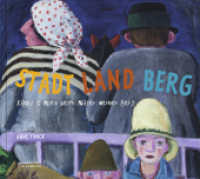基本説明
Findings concerning spatial perception and cognition suggest the existence of two distinct systems governing linguistic and non-linguistic representations, that only partially overlap in some pathologies, but they also show the strong impact of language-specific factors on the course of language acquisition and cognitive development. From table of contents: What makes manner of motion salient? Explorations in linguistic typology, discourse, and cognition (Dan I. Slobin); The representation of spatial structure in spoken and signed language: Perspectives on classifier constructions in sign languages (Leonard Talmy).
Full Description
Space is presently the focus of much research and debate across disciplines, including linguistics, anthropology, psychology, and philosophy. One strong feature of this collection is to bring together theoretical and empirical contributions from these varied scientific traditions, with the collective aim of addressing fundamental questions at the forefront of the current literature: the nature of space in language, the linguistic relativity of space, the relation between spatial language and cognition. Linguistic analyses highlight the multidimensional and heterogeneous nature of space, while also showing the existence of a set of types, parameters, and principles organizing the considerable diversity of linguistic systems and accounting for mechanisms of diachronic change. Findings concerning spatial perception and cognition suggest the existence of two distinct systems governing linguistic and non-linguistic representations, that only partially overlap in some pathologies, but they also show the strong impact of language-specific factors on the course of language acquisition and cognitive development.
Contents
1. Introduction: Space, language, and cognition: Some new challenges (by Hickmann, Maya); 2. Part I - Typology of linguistics systems: Universals, variability, and change; 3. Encoding the distinction between location, source, and destination: A typological study (by Creissels, Denis); 4. The expression of static location in a typological perspective (by Grinevald, Colette); 5. What makes manner of motion salient?: Explorations in linguistic typology, discourse, and cognition (by Slobin, Dan I.); 6. The semantic structure of motion verbs in French: Typological perspectives (by Kopecka, Anetta); 7. From personal deixis to spatial deixis: The semantic evolution of demonstratives from Latin to French (by Marchello-Nizia, Christiane); 8. Motion events in Chinese: A diachronic study of directional complements (by Peyraube, Alain); 9. Part II - The nature and uses of space in language and discourse; 10. Are there spatial prepositions? (by Vandeloise, Claude); 11. Deitic space in Wolof: Discourse, syntax and the importance of absence (by Robert, Stephane); 12. The semantics of motion verbs: Action, space, and qualia (by Cadiot, Pierre); 13. The representation of spatial structure in spoken and signed language (by Talmy, Leonard); 14. Iconicity and space in French sign language (by Sallandre, Marie-Anne); 15. Part III - Space, language, and cognition; 16. On the very idea of a frame of reference (by Dokic, Jerome); 17. The relativity of motion in first language acquisition (by Hickmann, Maya); 18. Spatial language and spatial representation: Autonomy and interaction (by Landau, Barbara); 19. Deficits in spatial discourse of Alzheimer patients (by Denis, Michel); 20. Index








